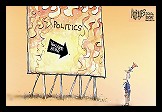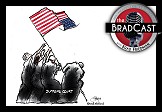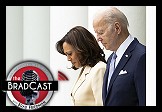 The question I hear time and time again from audiences who see my documentary film, Broadcast Blues is, "Why did you leave your lucrative career in broadcasting to become a media reform activist?"
The question I hear time and time again from audiences who see my documentary film, Broadcast Blues is, "Why did you leave your lucrative career in broadcasting to become a media reform activist?"
The truth is that, once upon a time, I worked in a newsroom where a corporate owner ordered me, a reporter, to skew my reporting to purposely make a man on trial for murder --- look guilty.
In an instant, my entire life changed. The trust I'd had in my news organization vanished. And the deeper I looked into the way corporate owners manage the message they want the public to hear, the more disillusioned I became.
There is more to that story --- so much more --- but you'll have to wait for me to finish my book to get all the chilling details on it.
But this is the kind of story that many reporters could tell, if only they dared. But when they dare, as Jane Akre and Steve Wilson did, they can get fired for telling the truth. (Who can forget the story of these Fox affiliate investigative reporters who tried to report on Monsanto Bovine Growth Hormone being injected into cattle, only for it to then be found in the milk supply, which experts said could cause cancer? WTVT fired them after Monsanto complained to Fox "News" chief Roger Ailes.) The reporters filed a whistleblower suit, and Akre won. But Fox won in the end, by getting a court order that, legally, news does not have to be true. Akre and Wilson lost not only their jobs, but ended up having to pay Fox' attorney fees. (See my story from Broadcast Blues on this case, including courtroom footage here.)
This is the kind of information I suspect the FCC was hoping to tease out in their planned "Multi-market Study of Critical Information Needs" [PDF] which, as I wrote last week at The BRAD BLOG, sparked a right wing firestorm in recent weeks when Republican FCC Commissioner Ajit Pai went public with a Wall Street Journal op-ed accusing his colleagues of "meddling with the news" by simply asking voluntary questions of newsrooms. The study was part of the FCC's statutory requirement to report to Congress every three years, as they have for decades, on identifying "barriers to entry into the communications marketplace faced by entrepreneurs and other small businesses."
The question for reporters from the CIN study that was most disturbing to Pai: "Have you ever suggested coverage of what you consider a story with critical information for your customers that was rejected by management?"...
From a purely journalistic point of view, having a government agency intrude on the autonomy of a news organization by asking questions about how they decide what to cover does seem improper. But from the reality of corporate driven news agendas, where truth is often obfuscated for reasons of profit or politics, the question is spot on.
Every news organization does have some kind of bias, and it can be found in the stories they choose (or don't choose) to cover. In response to my earlier piece on this topic, BRAD BLOG commenter "karenfromillinois" asked about a recent Guardian story on the NSA helping "their British counter parts spy on private video chats and capture naked pics of Americans which were then run thru some NSA program....creepy huh?" She noted that she'd only seen MSNBC's Chris Hayes pick up the story briefly, and asked "does a memo go out to ignore something that damaging to the government, or do all reporters just 'know' the msm rules?"
You have to realize there is a unique culture in every newsroom. Some news organizations, even in the corporate "MSM", work hard to hold government accountable to the public. And most reporters deeply value integrity in journalism. But for every reporter you see on TV, there are hundreds who would love to take that job --- and for less pay. So it's very difficult for reporters to openly challenge management decisions.
I note that in the two very dramatic cases I cited --- both my own and the Monsanto/Fox story --- the news directors were not at fault; in both cases, they stood up to upper management to defend their reporters. But in both cases, they crumbled under corporate pressure (and, I believe, the need to keep their own jobs.) But many news directors steer their staffs away from stories that reflect poorly on stations' advertisers. And it is not unusual for news managers to make an entire subject off limits for coverage by their reporters.
As to some memo going out to all news organizations, as issued from somewhere on high, presumably the government (or some other dark force), warning journalists to stay away from a particular story, I'm unaware of any such practice.
That, of course, doesn't mean they are serving the public interests well. As we learned from the corporate media's response to the CIN study kerfuffle, they would simply prefer not to answer any questions that reveal how poorly they are serving the public interest. And they won't have to. Late last Friday, an FCC spokesperson said the study "will not move forward," and that the agency will "reassess the best way to fulfill its obligation to Congress."
Score another round for right wing corporate media controlling the message.
While the government may seek to influence coverage by the media, there is no evidence the FCC was hoping to do so in this case. This was yet another case of the corporate media looking out for its own interests, rather than that of the public.
Sue Wilson is a media activist, director of Public Interest Pictures' Broadcast Blues, and a 22 year veteran of broadcast journalism. Her numerous awards include Emmy, AP, RTNDA, and PRNDI for work at CBS, PBS, FOX, and NPR. She is the editor of the media criticism blog, Sue Wilson Reports and founder of the Media Action Center.


 Kamala Rising:
Kamala Rising: Evidence Fails to Establish Attempted Trump Assass-ination Politically Motivated
Evidence Fails to Establish Attempted Trump Assass-ination Politically Motivated Former MAGA 'Cultist' on the State of the Race for 'MAGA Americans': 'BradCast' 7/23/24
Former MAGA 'Cultist' on the State of the Race for 'MAGA Americans': 'BradCast' 7/23/24  'Green News Report' 7/23/24
'Green News Report' 7/23/24
 Biden Out, Endorses
Biden Out, Endorses BIDEN DROPS REELECTION BID
BIDEN DROPS REELECTION BID Sunday 'You Are Here' Toons
Sunday 'You Are Here' Toons What J.D. Vance Forgot to Tell You (and Lied About) at the RNC: 'BradCast' 7/18/24
What J.D. Vance Forgot to Tell You (and Lied About) at the RNC: 'BradCast' 7/18/24 'Green News Report' 7/18/24
'Green News Report' 7/18/24 Holding on for Dear Life Amid the Political Whirlwind: 'BradCast' 7/17/24
Holding on for Dear Life Amid the Political Whirlwind: 'BradCast' 7/17/24 Cannon's Corruption: 'BradCast' 7/16/24
Cannon's Corruption: 'BradCast' 7/16/24 'Green News Report' 7/16/24
'Green News Report' 7/16/24 Amid the Assassination Attempt Aftermath:
Amid the Assassination Attempt Aftermath:
 Meanwhile... : 'BradCast' 7/11/24
Meanwhile... : 'BradCast' 7/11/24 'Green News Report' 7/11/24
'Green News Report' 7/11/24 Paging 'Johnny Unbeatable'! Dems (Actually!) in Disarray!: 'BradCast' 7/10/24
Paging 'Johnny Unbeatable'! Dems (Actually!) in Disarray!: 'BradCast' 7/10/24 SCOTUS Immunity Ruling 'As Bad as it Sounds', And Worse: 'BradCast' 7/9/24
SCOTUS Immunity Ruling 'As Bad as it Sounds', And Worse: 'BradCast' 7/9/24 So, What Now?: 'BradCast' 7/8/24
So, What Now?: 'BradCast' 7/8/24 Debunking MAGA Cult Xenophobia
Debunking MAGA Cult Xenophobia A Friendly Suggestion: Harris-Newsom 2024
A Friendly Suggestion: Harris-Newsom 2024 Prosecutor: SCOTUS Corruption Ruling Less Corrupt Than Appears: 'BradCast' 6/27/24
Prosecutor: SCOTUS Corruption Ruling Less Corrupt Than Appears: 'BradCast' 6/27/24 Good News and Bad: At the Polls and From the Corrupted Court: 'BradCast' 6/26/24
Good News and Bad: At the Polls and From the Corrupted Court: 'BradCast' 6/26/24 'Emptywheel' on Assange Hacking, Plea Deal: 'BradCast' 6/25/24
'Emptywheel' on Assange Hacking, Plea Deal: 'BradCast' 6/25/24
 VA GOP VOTER REG FRAUDSTER OFF HOOK
VA GOP VOTER REG FRAUDSTER OFF HOOK Criminal GOP Voter Registration Fraud Probe Expanding in VA
Criminal GOP Voter Registration Fraud Probe Expanding in VA DOJ PROBE SOUGHT AFTER VA ARREST
DOJ PROBE SOUGHT AFTER VA ARREST Arrest in VA: GOP Voter Reg Scandal Widens
Arrest in VA: GOP Voter Reg Scandal Widens ALL TOGETHER: ROVE, SPROUL, KOCHS, RNC
ALL TOGETHER: ROVE, SPROUL, KOCHS, RNC LATimes: RNC's 'Fired' Sproul Working for Repubs in 'as Many as 30 States'
LATimes: RNC's 'Fired' Sproul Working for Repubs in 'as Many as 30 States' 'Fired' Sproul Group 'Cloned', Still Working for Republicans in At Least 10 States
'Fired' Sproul Group 'Cloned', Still Working for Republicans in At Least 10 States FINALLY: FOX ON GOP REG FRAUD SCANDAL
FINALLY: FOX ON GOP REG FRAUD SCANDAL COLORADO FOLLOWS FLORIDA WITH GOP CRIMINAL INVESTIGATION
COLORADO FOLLOWS FLORIDA WITH GOP CRIMINAL INVESTIGATION CRIMINAL PROBE LAUNCHED INTO GOP VOTER REGISTRATION FRAUD SCANDAL IN FL
CRIMINAL PROBE LAUNCHED INTO GOP VOTER REGISTRATION FRAUD SCANDAL IN FL Brad Breaks PA Photo ID & GOP Registration Fraud Scandal News on Hartmann TV
Brad Breaks PA Photo ID & GOP Registration Fraud Scandal News on Hartmann TV  CAUGHT ON TAPE: COORDINATED NATIONWIDE GOP VOTER REG SCAM
CAUGHT ON TAPE: COORDINATED NATIONWIDE GOP VOTER REG SCAM CRIMINAL ELECTION FRAUD COMPLAINT FILED AGAINST GOP 'FRAUD' FIRM
CRIMINAL ELECTION FRAUD COMPLAINT FILED AGAINST GOP 'FRAUD' FIRM RICK SCOTT GETS ROLLED IN GOP REGISTRATION FRAUD SCANDAL
RICK SCOTT GETS ROLLED IN GOP REGISTRATION FRAUD SCANDAL VIDEO: Brad Breaks GOP Reg Fraud Scandal on Hartmann TV
VIDEO: Brad Breaks GOP Reg Fraud Scandal on Hartmann TV RNC FIRES NATIONAL VOTER REGISTRATION FIRM FOR FRAUD
RNC FIRES NATIONAL VOTER REGISTRATION FIRM FOR FRAUD EXCLUSIVE: Intvw w/ FL Official Who First Discovered GOP Reg Fraud
EXCLUSIVE: Intvw w/ FL Official Who First Discovered GOP Reg Fraud GOP REGISTRATION FRAUD FOUND IN FL
GOP REGISTRATION FRAUD FOUND IN FL


































